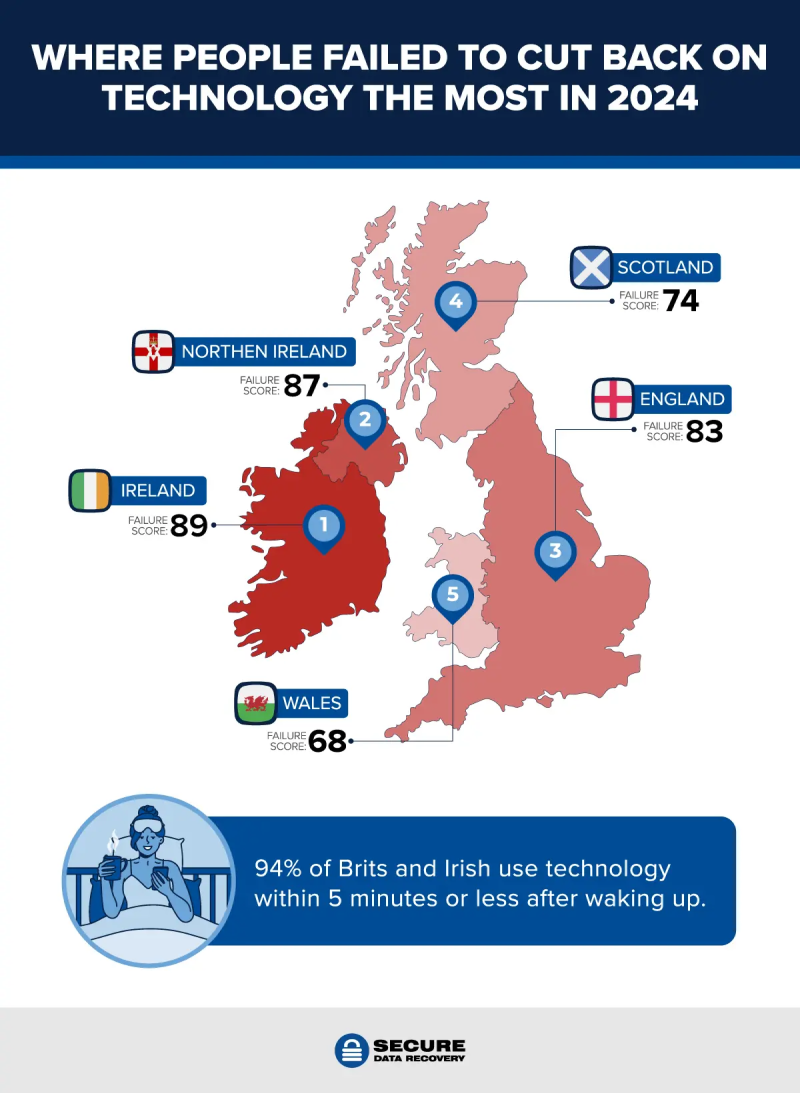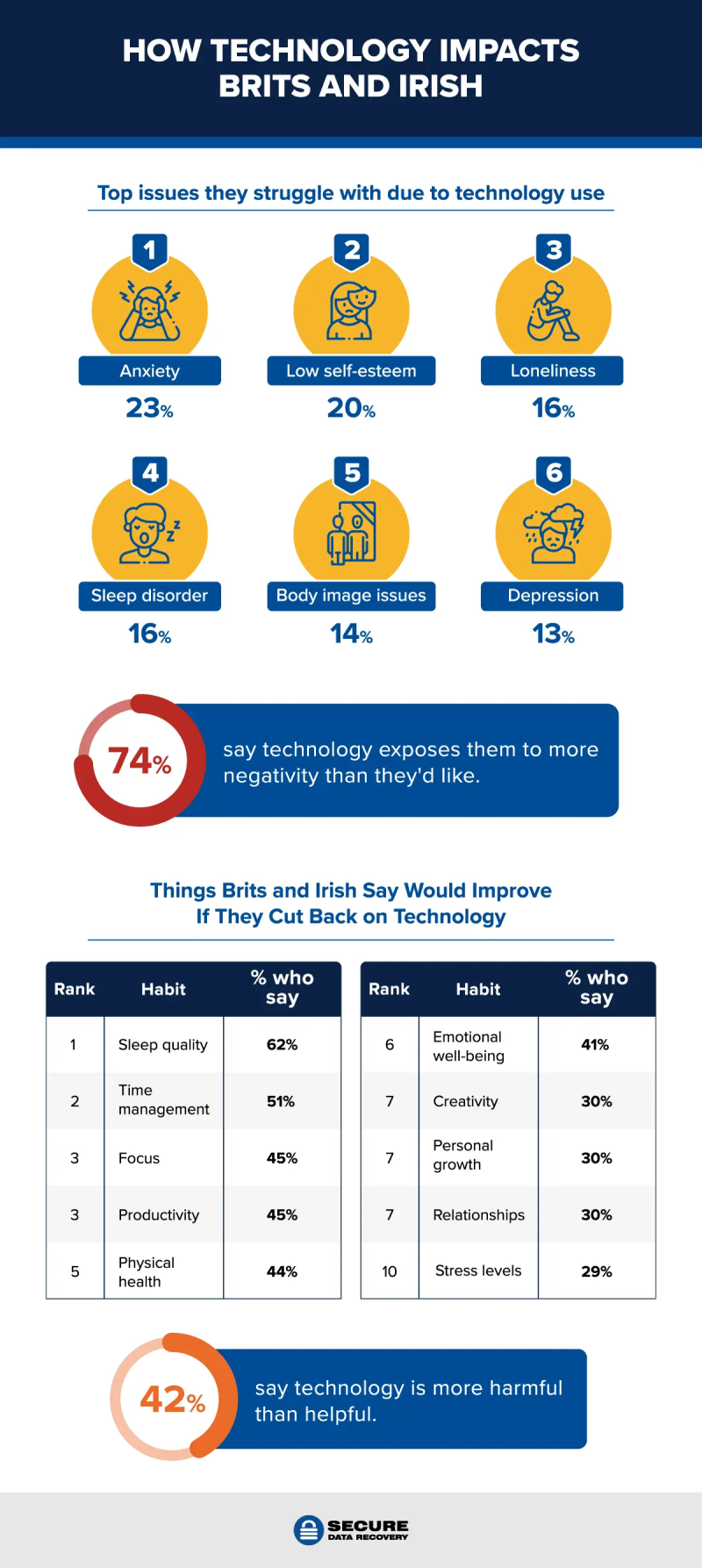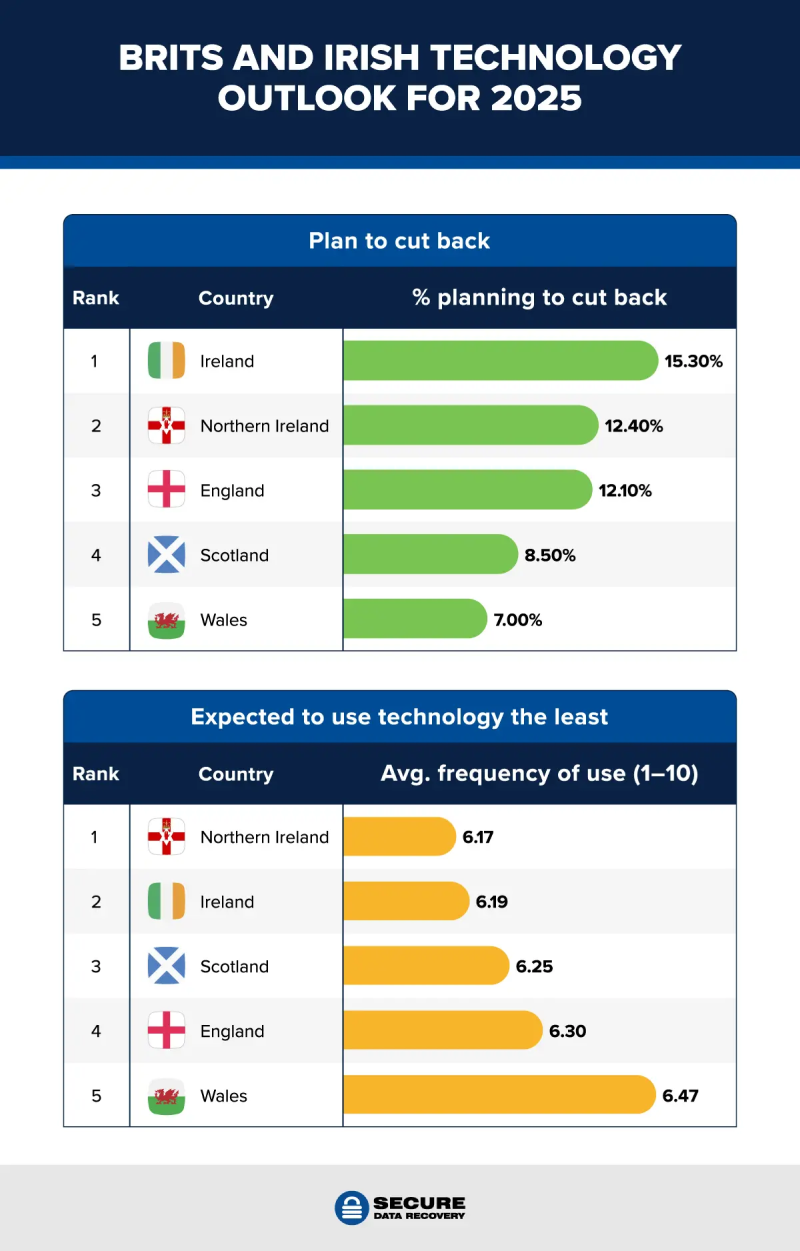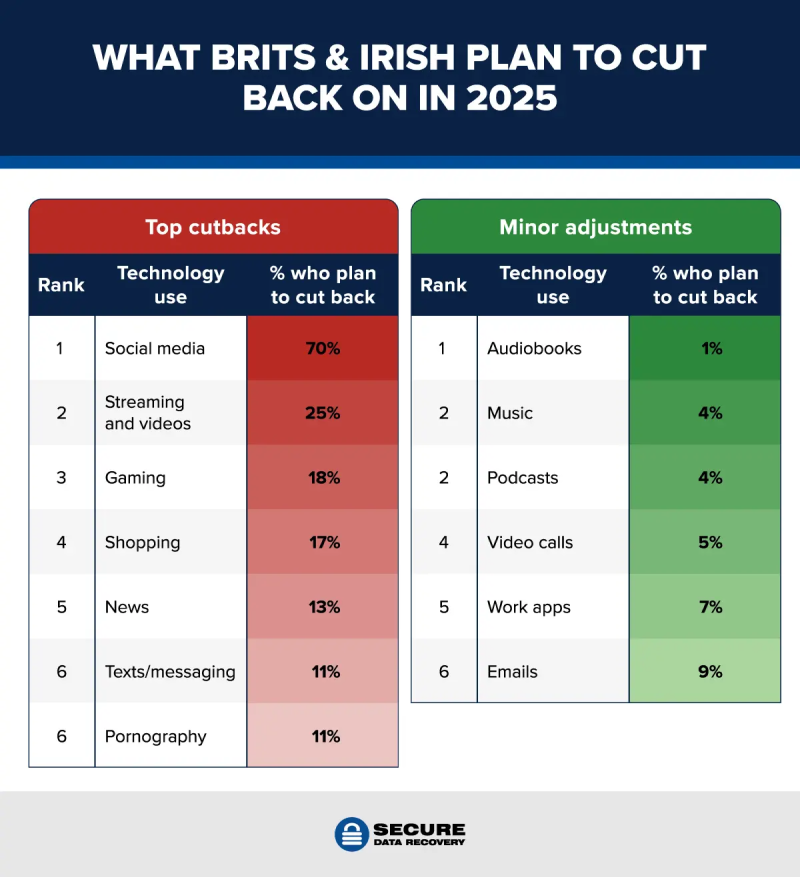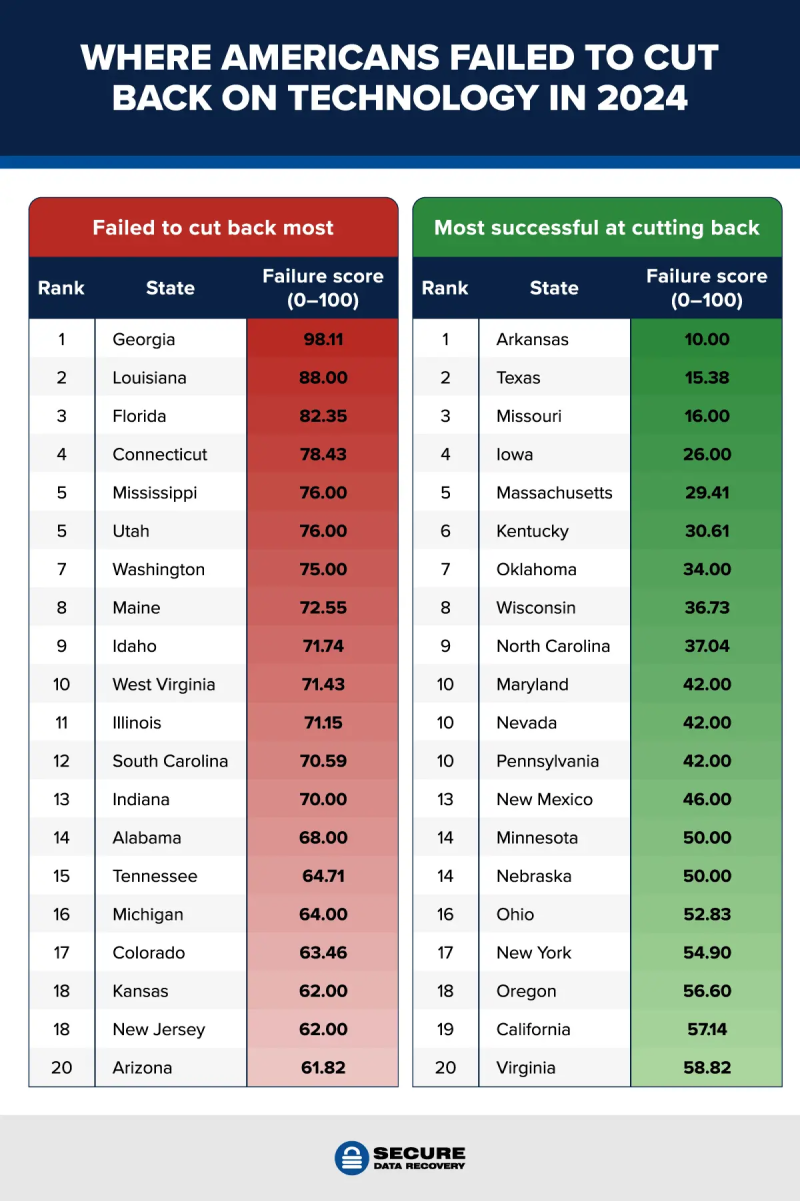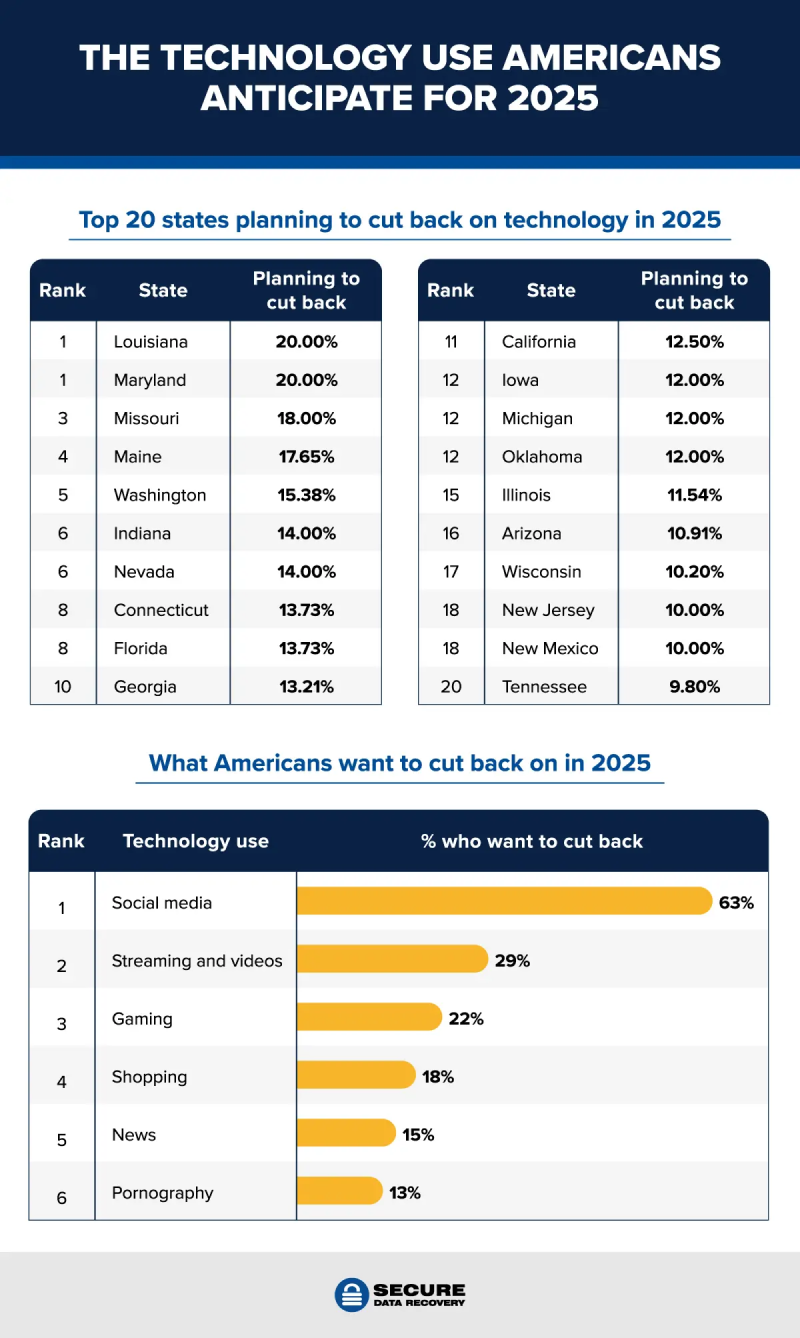As we start 2025, it's time to think about this year's goals and reflect on the resolutions you set for 2024. If you’re like many, cutting back on technology was high on the list, whether it was to reduce your time scrolling on social media, decrease your binge-watching hours, or cut back on online shopping. Many people made well-intentioned goals that for some, turned out to be easier said than done.
At Secure Data Recovery, we surveyed Americans earlier this year to determine where people were planning on cutting back on technology in 2024. To follow up on their success, we ran a similar study to find out how their resolutions went. This time, we also surveyed people in the UK and Ireland to get a broader understanding of how tech-related resolutions went across different countries. Read on to find out where people found it most challenging to make lasting changes in their tech use habits!
Key findings
Brits vs. Irish: Who failed to cut back on technology most in 2024?
Technology isn’t all bad, in fact, without technology many people wouldn’t be able to work, connect with loved ones, or access information that benefits their daily lives. However, the constant presence of screens and staying connected online can sometimes feel overwhelming, which results in people feeling disconnected from the world around them.
In an effort to reset, many people create goals to unplug more and enjoy life offline. Whether connecting with nature, engaging in more face-to-face conversations, or just enjoying the peace of silenced notifications, taking a step back from technology can help improve many people’s lives.
However, despite the goals set and enticing rewards, many people struggle to spend as much time offline as they’d like. In fact, 23% of Brits and Irish say they used technology more than they intended to in 2024. To determine where exactly people failed to unplug most, we surveyed people asking them about their technology use in 2024 versus what they had anticipated it would be when the year started. People in Ireland, Northern Ireland, and England failed at cutting back on technology in 2024 the most.
A difficult aspect of trying to cut back on your technology use is that for many, technology is needed for essential daily tasks. Whether you use your phone alarm to wake up, check emails for work, or use a GPS app to avoid traffic during your commute, it can be hard to put your devices down when you’re so used to using them.
At the start of each day, 94% of Brits and Irish say they use technology within 5 minutes or less after waking up. The use throughout their day doesn’t seem to slow down, as 72% say they’re shocked by how much time they spend on their phone. The constant reliance on technology can make it hard to truly live a life more disconnected from your online one.
When it comes to the negative impacts of technology use, the effects can be both psychological and physical. For starters, Brits and Irish reveal that they’ve struggled with anxiety, low self-esteem, and loneliness due to technology use.
The constant pressure to always stay connected and be in the know can leave people feeling anxious, while comparing your life to others online can lead to low self-esteem, and racking up virtual friends can leave you feeling lonely once you unplug. These drawbacks leave some wondering if life is better offline, as 42% say technology is more harmful than helpful, and 74% say technology exposes them to more negativity than they'd like.
When it comes to physical impacts, prolonged screen time has been linked to several issues like eye strain, poor posture, and disrupted sleep patterns. In fact, the top thing that people say would improve in their life if they cut back on technology was their sleep quality. Whether they’re too anxious they’re missing something online to sleep, or staying up late to binge-watch a new show, technology often prevents many people from getting the hours of sleep they need. Other things that Brits and Irish report would improve in their lives are time management, focus, and productivity.
British and Irish technology use goals for 2025
Despite their failed efforts in 2024, Brits and Irish are setting new goals to cut back on their technology use in 2025. Although Ireland, Northern Ireland, and England were the top three countries that failed to cut back this year, they’re also the top countries with goals to cut back next year. This renewed commitment shows how much they feel they need to reduce technology use in their lives. For some, the desire to cut back comes from fear for their online safety, as 72% say data breaches have prompted them to cut back on technology.
With everyone using technology in unique amounts, cutting back on its usage looks different for each person. For some, it could mean disconnecting from social media entirely, changing their nightly routine from watching a show to reading, or setting strict screen time limits.
To find out where people’s usage is expected to be the highest, we asked Brits and Irish what they expected their technology use in 2025 would be on a scale of 1 to 10, with 10 being very high. The countries where people expect to use technology the least in 2025 are Northern Ireland, Ireland, and Scotland. People in Wales expect to use technology the most.
When laying out the most popular ways people use technology in their lives, Brits and Irish revealed what they’re planning to cut back on. At the top of the list is social media, with 70% saying they plan to cut back on its usage in 2025. For many, social media can be addictive, with so many different platforms and intriguing content on each, it can be easy to spend more time than you realise scrolling away. Streaming and videos, and gaming fall next on the list of tech uses people plan to cut back on.
Everyone who plans to cut back will need to attempt to do it in a way that will work best for them. While some may need to set up tech-free times, permanently delete accounts, or physically turn off devices, to truly live a more disconnected life, you have to know your weaknesses. The top things Brits and Irish have done to try to cut back on technology are using apps to monitor or restrict behavior, physical confinement or separation from their devices, and enlisting an accountability partner.
The U.S. states that failed to cut back on technology in 2024
With our original study looking at where Americans were planning on taking a break from technology in 2024, we decided to follow up with our friends across the pond to see how well they achieved their goals. When asked questions about their technology use this past year, people in Georgia, Louisiana, and Florida were the top states that failed to cut back on technology in 2024. Overall, 26% of Americans say that they used technology more than they intended to in 2024.
Compared to Brits and Irish, Americans are slightly better at waiting longer before using technology in their day. Only 86% of Americans use technology within 5 minutes or less of waking up, compared to 94% of Brits and Irish. However, for Americans, that number is significantly higher than in the beginning of 2024 when only 61% said they use technology within 5 minutes or less of waking up. Only 1% of people in both areas wait more than an hour before using technology in their day.
Another number that is higher for Americans than at the start of the year is the hours they spend with their device in hand. In early 2024, only 56% were shocked by how much time they spent on their phone, that number is now up to 63%.
How Americans plan to cut back on technology in 2025
Despite their challenges achieving their goals, just like Brits and Irish, many Americans are setting new goals to achieve a more digital-free life in 2025. Although Louisiana landed in the top 3 states that failed to cut back in 2024, the people in that state are still optimistic about making a change in 2025. Louisiana and Maryland are the top states that plan to cut back on technology in 2025.
When deciding where they need to cut back on their technology use, Americans, Brits, and Irish are extremely alike. Social media, streaming and videos, and gaming are also the top three things Americans hope to use technology for less in 2025. Although technology can be a powerful tool for connection and entertainment, it can also lead to a sense of disconnection from the real world. This shared concern to cut back shows that the overuse of technology is impacting the lives of people all over the world.
Conclusion
As we look ahead to 2025, it’s important to acknowledge any shortcomings from this year and use them to refine your goals in the coming year. While technology isn’t going anywhere, there are ways to incorporate it into your life without feeling like you’re giving too much. From taking dedicated tech breaks to deactivating subscriptions, there are small steps you can take to accomplish your goals.
Along with thinking about your use of technology, it’s important to consider the security of your data. While a data loss isn’t actively on anyone's 2025 bingo card, many people will find themselves in need of cellphone data recovery services, laptop data recovery services, or hard drive recovery services. If you do find yourself in need of data recovery services, it’s important to know who to turn to.
At Secure Data Recovery, we have a team of data recovery engineers who have a 96% success rate for recovering data from all types of device failures. Our team is ready to help you at one of our facilities in several of the largest cities in the UK.
Methodology
In November 2024, we surveyed 3,067 people across the U.S., UK, and Ireland, about their use of technology. We asked respondents to reflect on any goals they set regarding technology use in 2024 and share how well they accomplished them.

